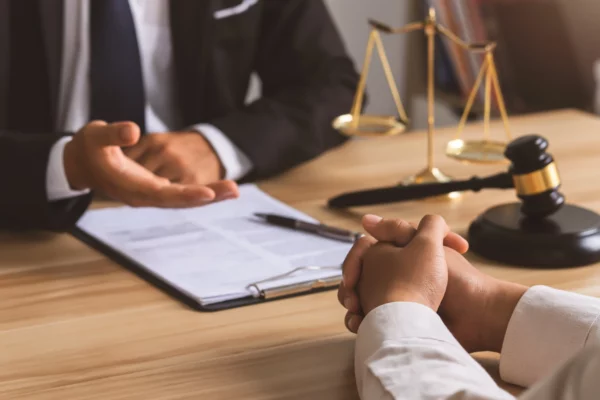What You Need to Know and Understand About Hearsay Rules in California
Have you ever found yourself in a courtroom, with your fate hanging on a statement made by someone who is not present? That is the weight of hearsay in the legal world, and it could sway the verdict of your case. When your future is uncertain, you need an experienced criminal defense attorney who can help you understand what is hearsay in California.
At 805 Law Group, we are a reputable law firm serving San Luis Obispo County, including Atascadero. Our firm has a well-established history of achieving favorable outcomes in court cases. We possess an unparalleled understanding of California’s hearsay laws with over two decades of experience in criminal defense. Our team of defense attorneys has successfully handled numerous cases involving hearsay evidence. Throughout the legal process, we keep you well-informed, ensuring you comprehend your options and the potential consequences of hearsay evidence.
Your future is too important to leave to chance. Contact our skilled criminal defense attorney at 805 Law Group today, and let us help you navigate the intricacies of California’s hearsay law and legal landscape. Do not hesitate to call us now if you are unsure how hearsay could impact your situation!
What is Hearsay?
Hearsay is a legal term defined as an out-of-court statement presented as evidence to prove the statement is true. We break down this definition below for better understanding:
- Out-of-Court Statement: Hearsay involves statements made by individuals outside the courtroom setting. These statements are made in various contexts, such as conversations, documents, or social media, and not while the person is testifying during the ongoing legal proceedings.
- Presented as Evidence: Hearsay occurs when this out-of-court statement is introduced during a trial or legal proceeding as evidence to support a claim, argument, or point.
- To Prove the Truth: The primary purpose of introducing hearsay evidence is to establish that the statement is true or to prove that what was said or written in the out-of-court statement is accurate.
With this breakdown, you can now explore the broader realm of what is hearsay in California and its evidence in the context of California law.
What is Hearsay Evidence?
In California, hearsay evidence defined in the Evidence Code Section 1200 refers to evidence that consists of a statement made by someone who is not currently testifying as a witness in a legal proceeding. This type of evidence is presented to establish the accuracy or truth of the statement itself.
However, hearsay evidence is generally not admissible in court unless it falls within specific legal exceptions. This rule is commonly known as the hearsay rule.
Why Does A Hearsay Rule Exist?
The hearsay rule is a fundamental principle in legal proceedings, primarily driven by these key reasons why it exists:
- The hearsay rule in the legal system ensures the reliability and trustworthiness of evidence presented in court.
- It protects against introducing potentially unreliable or misleading statements into court proceedings.
- Hearsay statements, typically statements made outside the courtroom and offered for their truth, are generally considered less reliable because they are not subject to cross-examination or other scrutiny.
- This rule helps maintain fairness in legal proceedings by allowing both parties to present their case and challenge the evidence against them.
- It also preserves the defendant’s constitutional right to confront and cross-examine witnesses, a fundamental aspect of the adversarial system.
What are the Two Key Elements of Hearsay Evidence?
Hearsay evidence is a statement made out of court offered in court as evidence to prove the truth of the matter asserted. The two crucial elements of hearsay evidence are:
Outside Statement
The statement in question was made outside of the courtroom. Those could be:
- spoken words
- written correspondence
- digital communications like texts or emails
Purpose
- The statement is being introduced in court to validate the truth of its content.
- If a statement is introduced in court for some reason other than to prove the truth of the matter it asserts (for instance, to prove that a statement was made merely or to show someone’s state of mind), then it might not be considered hearsay, even if it meets the first element.
If you have clarifications and further questions on what is hearsay evidence in California, call our skilled attorney at 805 Law Group now. Our experienced criminal defense team is here to provide you with the guidance and support you need. Contact us today to discuss your case.
What are Examples of Hearsay Statements?
To illustrate what qualifies as a hearsay statement, let us examine some real-life instances:
Witness Testimony
Imagine a witness testifying: “John informed me that he witnessed the defendant at the crime scene.” That constitutes hearsay because it is an out-of-court statement used to prove the defendant’s presence at the scene.
Written Statements
If there is a written letter from someone not present in court, asserting that they witnessed a crime, it also qualifies as hearsay when presented to establish the truth of the described events.
Social Media Posts
Even social media posts can become part of legal proceedings. For instance, if a Facebook post is introduced to demonstrate that the author was at a specific location during a particular time, it might be considered hearsay if used to prove the statement’s truth.
These examples highlight the broad spectrum of statements falling under the hearsay category and emphasize why courts often exclude such evidence.
How Do I Know the Exceptions to the Rule Against Hearsay Evidence?
Hearsay evidence is inadmissible in court unless an exception outlined in a statute or rule permits it. Even if a statement qualifies as hearsay, it can be admitted if it falls within an established exception. The Federal Rules of Evidence (FRE) outlines nearly thirty exceptions, illustrating the topic’s intricacy.
What are the Most Commonly Hearsay Exceptions?
While the FRE lists twenty-three exceptions that permit out-of-court statements even if the declarant is available for court testimony, only a few are used. Here are three of the most commonly invoked exceptions:
Present Sense Impression
An out-of-court statement can be admitted if it describes or explains an event or condition and is made concurrently with or immediately after the event.
- Example: If a witness heard someone say: “The car is skidding!” during a car accident, this statement could be admitted under this exception.
Excited Utterance
This exception is closely related to the present sense impression. The criteria for this exception are that there was a surprising event, and the statement was made while the person was still under the excitement or stress of that event.
- Example: If someone shouted, “He shot him!” immediately after witnessing a shooting, this statement might be admitted under this exception.
Then-Existing Mental, Emotional, or Physical Condition
A statement that is introduced to prove the truth of its content but rather to illustrate the person’s state of mind, emotion, or physical condition at that time.
- Example: Testimony that a couple had a loud argument can be presented to demonstrate that they were angry, not necessarily to confirm the specifics of what they said.
The exceptions to the hearsay rule are integral to legal proceedings, allowing certain out-of-court statements to be considered based on their reliability and relevance. Always consult with legal professionals to navigate the intricacies of hearsay in California and its exceptions. Contact our criminal defense attorney at 805 Law Group today.
Understand What is Hearsay in California For a Strong Criminal Defense
A clear understanding of hearsay is crucial, especially if you’re facing criminal charges and hearsay evidence has been presented against you. It is a complex and uncertain situation that can weigh heavily on you. In such times, having an experienced San Luis Obispo criminal defense attorney by your side can make all the difference in protecting your rights and defending your freedom. Our team possesses valuable knowledge of California law, particularly the hearsay rule, and we are here to guide you through this intricate legal landscape.
Our experienced attorneys have handled cases involving hearsay evidence and are well-equipped to challenge its admissibility effectively. We combine legal proficiency with a commitment to providing personalized and compassionate representation, ensuring your rights are safeguarded.
If you are ready to secure the best possible outcome for your case, don’t hesitate to consult our experienced San Luis Obispo criminal defense attorney at 805 Law Group today. We can also help with your concerns on family law, personal injury, and estate planning.


